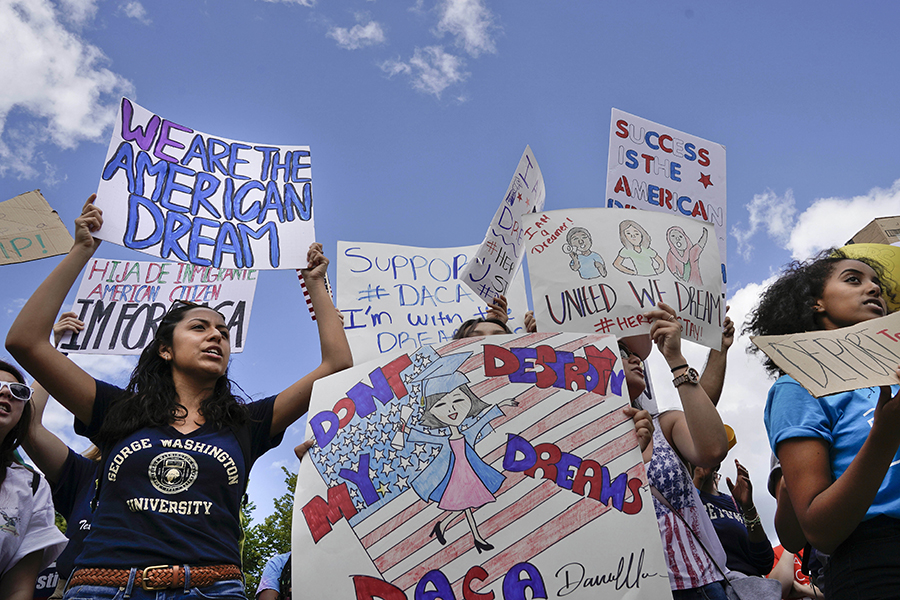Trump Rescinds DACA
Supporters of Deferred Action for Childhood Arrival program (DACA) demonstrate on Pennsylvania Avenue in front of the White House in Washington, Saturday, Sept. 9, 2017. President Donald Trump ordered and end of protections for young immigrants who were brought into the country illegally as children, but gave Congress six months to act on it. (AP Photo/Pablo Martinez Monsivais)
On September 5th, President Donald Trump announced the rescinding of the DACA program, an American immigration policy created to provide amnesty for young undocumented immigrants.
DACA ((Deferred Action for Child Arrivals) allowed for illegal immigrants to remain in the U.S. legally if they met specific criteria, including having no felony charges or significant misdemeanor, being enrolled in school or having obtained a GED/diploma, and having reached the United States before their 16th birthday. Trump will be giving lawmakers approximately 6 months to make appropriate changes to the program.
“We’ll be coming out with a new policy,” Donald Trump said about the upcoming plans for replacement in a recent press conference. “We’re going to work something out.”
This decision affects over 800,000 individuals, known as DREAMers, currently taking part in the program. DACA allows these people to work in the U.S. and pursue stable careers without fear of deportation.
“Residence, education, any rights that they have attained [through DACA] could be taken away,” senior Mirna Hernandez said. “They’re living their lives in fear”.
DACA was passed under President Obama in 2012 through an executive order. Because of the methods used to pass it, Donald Trump was able to remove the program with executive authority.
“DACA is an unconstitutional exercise of authority,” Jeff Sessions said in his announcement of DACA’s ending. “The executive branch deliberately sought to achieve what the legislative branch specifically refused to authorize on multiple occasions.”
In a letter involving 10 state attorney generals, led by Attorney General Ken Paxton, set September 5th as a deadline for Trump to end DACA. If he failed to do so, Paxton threatened to amend the complaint in the case against DAPA (Deferred Action for Parents of Americans) – a Texas lawsuit that won – to include DACA.
“DACA is about rule of law and constitutional separation of powers, not…any particular immigration policy”, Paxton said in the letter in response to backlash from the public.
This decision has been met with extreme controversy, with many democrats, as well as some republicans, publicly opposing the decision. Following its announcement, politicians took to Twitter to voice their concern. Virginia senator Tim Kaine tweeted “Rescinding DACA forces #DREAMers back into the shadows & puts them in danger of being deported from the country they love and know as a home,” while Senator Jeff Flake of Arizona tweeted “It should be evident from the fear and confusion surrounding #DACA that executive actions have a short shelf life…”.
“I don’t think there’s very many people that actually want to deport those who have been saved from deportation,” Mr. Gary Nelson, AP Economics teacher said. “The issue is passing [DACA] legally”.
Trump has taken to Twitter on this issue, tweeting, “Congress, get ready to do your job – DACA!”. Whether Congress can create something substantial in the next 6 months, only time will tell. But, in the meantime, hundreds of thousands of people are left in residential and political purgatory.
“Coming from a family of immigrants, it hits close to home,” Hernandez said. “These people are scared and we don’t really know what’s going to happen.”







